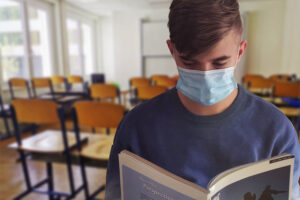Such –
The organization of Tokyo Games and the International Olympic Committee (IOC) insist on promising a safe Olympic event (July 23-August 8) despite the pandemic, but Japanese health experts doubt this possibility.
“Even without the coronavirus pandemic, the Olympic Games, as a mass grouping, favor all kinds of infectious diseases,” he tells the AFP Atsuo Hamada, a specialist at the Tokyo Medical University.
The organizing committee Tokyo-2020 has started to set new rules for participants. There will be a health check before arrival in Japan, regular tests once in the country, restrictions and follow-up of contacts, as well as a limitation on the stay at the Olympic Village.
Olympic officials underline the success of other sporting events during the pandemic, but health experts reply that the Games have a larger dimension, with more than 11,000 athletes from more than 200 countries in Tokyo.
“There can be no higher risk”, says Michael Head, a global health researcher at the University of Southampton (UK), asked about the AFP.
Although athletes are vaccinated before, “there could be certain variants that present some resistance to the vaccine,” estimates the expert.
“Bringing people together from so many different countries will only accelerate the likelihood of seeing a new variant appear,” adds Head.
“Anything that can be done to reduce risk is done,” says Hassan Vally, professor of public health at La Trobe University in Australia. “But risk cannot be completely reduced“, Add.
“If you look at things from a public health angle, organizing a Games is all you don’t feel like seeing right now“Hassan Vally summed up.
The organization of the Games awaits spring to make some tough decisions, including the possibility of limiting or prohibiting spectator access to stadiums.
“It is inconceivable to let in viewers from around the world”, cree Atsuo Hamada.
Head believes that number of spectators should be as limited as possible. “This will not eliminate the risk, but it would reduce it,” he says.
The start of vaccination raised hopes for the Games, although some countries have announced that they do not plan to vaccinate their athletes before the summer, while the IOC and Japan believe that vaccination is an essential condition to participate in the event.
Unavoidable infections
Koji Wada, a Japanese public health expert, believes it is unlikely that all athletes and the entire Japanese population will be vaccinated before the opening of the Olympic event on July 23.
“Vaccines are a tool to protect each one and not the others”said this professor from the Tokyo International Health University, who advises the Japanese government on the management of the pandemic.
Wada recommends that the organization evaluate whether some sports involve too close physical contact, such as judo, although amputating any of its disciplines from the Games seems unlikely.
Head is more direct. From a health point of view, organizing the Games “doesn’t make any sense at the moment.”
Other experts open their hands to take measures so that the Games can be played.
Atsuo Hamada can imagine the Games “with frequent checks, athletes and staff limiting their movements and in bubbles, with everyone following the event on television.”
Hassan Vally believes that the Games can be held but that the organization must assume that there will be infections.
“It is It is impossible for the Games to be held without some scandal linked to the virus. How to respond will be the biggest challenge, “he says. (D)











